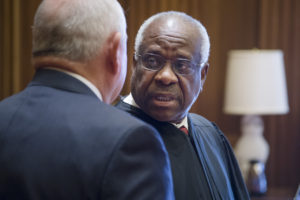Don’t Expect Supreme Court Action on the Senate’s Torture Report
The anticipated litigation about the CIA's interrogation tactics will soon land in the lap of the nine justices who sit on the Supreme Court, as issues of critical national importance invariably do. How the high court will rule, however, remains a disturbingly open question. Shutterstock
Shutterstock
Now that the Senate has released an executive summary of its report on the use of torture by the CIA during the George W. Bush-era war on terror, litigation is sure to follow to probe the legality of the techniques the agency deployed in secret interrogation sites around the world. The techniques, which were used against 119 detainees according to the summary, included repeated waterboarding, death threats, prolonged sleep deprivation and medically unnecessary rectal feeding as a “way to exert total control” over terror suspects.
Sooner rather than later, the anticipated litigation will land in the lap of the nine justices who sit on the Supreme Court, as issues of critical national importance invariably do. How the high court will rule, however, remains a disturbingly open question.
As always, the best — though by no means certain — predictor of how the court will respond is its recent record on the subjects of enhanced interrogation and human rights violations generally. Below is a summary of some of the court’s most significant post-9/11 cases on the topics. In evaluating the predictive potential of the cases, keep in mind the court’s shifting composition: specifically, that former Chief Justice William Rehnquist died in 2005; and former Associate Justices Sandra Day O’Connor, David Souter and John Paul Stevens retired in 2006, 2009 and 2010, respectively. We’re dealing with a judicial body that has steadily and relentlessly moved to the right.
Hamdi v. Rumsfeld (2004): This was a habeas corpus action involving Yasser Esam Hamdi, a U.S. citizen apprehended in Afghanistan and imprisoned at the Guantanamo Bay Naval Base in Cuba. In a plurality decision in which a majority of justices agreed on the ultimate result but not all aspects of legal reasoning, the court recognized the federal government’s power to detain terror suspects but held that U.S. citizen detainees retained due process rights to challenge their detentions before an impartial authority. Justice Clarence Thomas notably penned a dissent (joined by no other justices) that would have upheld executive power, completely denying due process rights to detainees pursuant to the president’s war-making powers.
Rasul v. Bush (2004): In a 6-3 ruling involving suspects housed at Guantanamo, the court held that U.S. citizen detainees have the right to challenge their incarceration via habeas corpus petitions. Justices Antonin Scalia and Thomas, along with Rehnquist, dissented.
Rumsfeld v. Padilla (2004): Notwithstanding the newly clarified habeas corpus rights of American detainees, the court dismissed the petition filed by Jose Padilla, who was apprehended in Chicago on suspicion of being an agent of al-Qaida, because Padilla’s petition had been filed in the wrong venue of New York rather than South Carolina, where he was jailed. The 5-4 majority decision was authored by Rehnquist. Justices Stevens, Souter, Ruth Bader Ginsburg and Stephen Breyer dissented. In 2012, the Supreme Court declined to review a lower court ruling that had dismissed a new lawsuit filed on Padilla’s behalf, alleging that he had been tortured while imprisoned in South Carolina.
Hamdan v. Rumsfeld (2006): In a 5-3 decision involving a habeas corpus petition filed by Salim Ahmed Hamdan, Osama bin Laden’s onetime bodyguard and chauffeur, the court ruled that the military commissions set up to try cases at Guantanamo violated both the Uniform Code of Military Justice and the Geneva Conventions of 1949. Scalia, Thomas and newly confirmed Justice Samuel Alito dissented. In response to the court’s decision, the military commissions were revamped and continue to operate.
Boumediene v. Bush (2008): In another habeas corpus action, this time brought by a citizen of Bosnia and Herzegovina jailed at Guantanamo, the court held by a margin of 5-4 that foreign detainees could file cases in the federal district courts. Scalia, Thomas, Alito and the court’s Rehnquist successor, Chief Justice John Roberts, dissented.
United States v. Ressam (2008): In a case involving Ahmed Ressam, the “Millennium Bomber” who was apprehended after crossing into the U.S. from Canada with bomb-making material that he planned to detonate at LAX, the court by a vote of 8-1 reinstated two federal felony convictions that had been vacated by the 9th Circuit Court of Appeals. Only Breyer dissented.
Holder v. Humanitarian Law Project (2010): In a 6-3 decision written by Roberts, the court upheld federal law, as incorporated by the 2001 Patriot Act, banning “material support,” including “advice,” to designated foreign terrorist organizations. Ginsburg dissented, joined by incoming Justices Elena Kagan and Sonia Sotomayor, objecting that the law criminalized pure speech. Mohamad v. Palestinian Authority (2012): In a unanimous decision, the court held that lawsuits against overseas assailants under the Torture Prevention Act of 1991 authorized claims only against individuals and not against organizations. Human rights activists claimed in response that the holding rendered the Prevention Act “toothless.”
Mohamed v. Dataplan (2011): In a growing trend, the court declined to review an ACLU case brought on behalf of five victims of extraordinary renditions against Dataplan Inc., a private CIA contractor. The plaintiffs alleged they had been tortured in Morocco, Egypt and Afghanistan. The high court’s failure to intervene effectively upheld a lower court ruling dismissing the lawsuit because the case might have exposed secret government counterterrorism information.
Vance v. Rumsfeld (2013): The court rejected a petition asking it to review a decision of the 7th Circuit that had dismissed a damages action brought by two private American contractors who alleged they had been tortured by the U.S. military in Iraq. As the high court had his back, Rumsfeld skated free.
Kiobel v. Royal Dutch Petroleum (2013): In a case involving claims of torture brought in federal court by Nigerian nationals against Royal Dutch Shell, claiming that the giant oil conglomerate had been complicit in torture carried out by the Nigerian government, the court held that the Alien Tort Claims Act does not apply in American courts to the extraterritorial acts of non-U.S.-based multinational companies. The court divided 5-4, strictly along party lines.
Clapper v. Amnesty International (2013): In a 5-4 majority opinion written by Alito, the court dismissed a complaint brought by Amnesty International and other human rights groups challenging National Security Agency spying, reasoning that none of the organizations had suffered actual legal harm, and thus lacked “standing” to sue. None could show, the majority argued, that its communications in fact had been intercepted in the past or that they would likely be intercepted in the future.
Hedges v. Obama (2014): The court declined to hear a case brought by Truthdig columnist Chris Hedges contesting the constitutionality of the indefinite detention provisions of the National Defense Authorization Act. The court’s failure to examine the merits of Hedges’ challenge operated to uphold a lower court ruling dismissing the case for lack of standing pursuant to the Clapper case.
It is impossible to predict with certainty how the Supreme Court will react when new torture and human rights cases are brought before it in the wake of the Senate’s torture report. Still, we can reliably bank on two guideposts: first, that the court will go to extraordinary lengths, citing technicalities such as standing and venue and perhaps statutes of limitations, to avoid ruling on the merits of future cases, as it has done time and again in the recent past.
Second, and most important, the court’s dominant Republican majority is unlikely to shed its extremely partisan predispositions and loyalties. The majority, now firmly entrenched and far more intransigent under the direction of Roberts than the panel was under Rehnquist, has transformed American law and jurisprudence into a distorted form of “politics by other means.” Don’t expect that transformation to change any time soon, torture notwithstanding.
Your support matters…Independent journalism is under threat and overshadowed by heavily funded mainstream media.
You can help level the playing field. Become a member.
Your tax-deductible contribution keeps us digging beneath the headlines to give you thought-provoking, investigative reporting and analysis that unearths what's really happening- without compromise.
Give today to support our courageous, independent journalists.





You need to be a supporter to comment.
There are currently no responses to this article.
Be the first to respond.